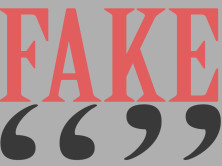
(Credit: Wikipedia/Espen Moe)
STORY HIGHLIGHTS :
|
Editor’s Note : The WikiLeaks staffers/volunteers we corresponded with requested anonymity for their protection against “threats and harassment.”
Earlier this month Julian Assange of Wikileaks fame emailed iMediaEthics to ask our help in pushing for greater prominence for eight corrections he obtained from McClatchy Co. news outlets for stories about him.
iMediaEthics was surprised, but not because he wrote days before he appealed for asylum to the Ecuadorian Embassy in London. Our surprise resulted from the reason he gave for his request. McClatchy told him that corrections to stories in the Los Angeles Times, The Miami Herald, The Charlotte Observer and The Sacramento Bee, as well as the McClatchy/Tribune news service, would have to be posted on the McClatchy website because there was no corrections page. Assange had reached out to McClatchy to get greater prominence for eight corrections his U.S. lawyer Michael Ratner had sought earlier.
McClatchy’s Chief of Correspondents Mark Seibel told iMediaEthics that he informed Assange that there aren’t any corrections pages. “Julian later asked if we didn’t have a more prominent way to note the corrections, such as a newspaper might have a corrections column,” Seibel wrote. “I said no.”
Seibel told us he “probably should have” let news outlets know of the changes but didn’t because it’s not his responsibility; rather, he said, it’s Assange’s duty to let them know of errors. That said, he indicated the errors weren’t very important, calling them small wording changes in old, currently low-trafficked stories.
Assange’s urgency came down to a distinction that many readers might have missed, but which go to the heart of his legal predicament. The corrections all relate to reporting on Assange’s extradition battle. Eight articles falsely stated there were charges against Assange. He faces only accusations.
“Truth is, I think Julian’s much more sensitive on the meaning of the word charges than we were,” he said. “What’s the difference between charges and allegations?”
There’s enough difference for Assange to press the matter directly. He wrote to Seibel: “If there is no separate corrections and clarifications page, what alternative would you suggest to address this issue?” and told iMediaEthics by email on June 16: “As they do not have a corrections page, it is unlikely that readers previously misinformed by the articles will view the corrected statements.”
But what Seibel failed to tell Assange is that the Times, The Herald, The Observer and The Bee all have correction pages where Assange’s corrections could have been prominently published in print, online and in databases such as LexisNexis. Most odd is that McClatchy, which does not own the Times, has unbeknownst to the Times, corrected three stories on McClatchy’s website without notifying the paper.

McClatchy corrects three Los Angeles Times stories on its website without letting the Times know. Above is screenshot of one of the three stories McClatchy corrected. (Credit: McClatchy, screenshot)
We asked all four papers whether they knew of the corrections, whether they knew McClatchy was making them without consulting them, and whether they were authorized to do so. We also asked whether, now fully aware, they would run their own corrections.

McClatchy corrects the above Miami Herald story on its website without letting the Herald know.
The Miami Herald quickly wrote back. Not to put too fine a point on it: The paper threw McClatchy under the bus:
“Your email is the first we’ve heard about this. Mr. Assange did not contact The Miami Herald for a correction. He did contact McClatchy, which made the corrections to several non-Herald stories and to one by Mr. Tamayo, but in an oversight McClatchy did not inform The Herald. (Our web story, by the way, dated Dec. 8, was not removed from our website. It simply expired.)
“Normally, McClatchy informs us of any errors in Miami Herald stories they run so we can both correct them. As I said, this was an oversight on their part.” The Herald editor continued, “We’ll run a correction in our print edition, and we’ll notify the news databases to correct the story.” Further, The Herald told us it would run its own print correction today (June 27) and let news archives databases know about its correction.
Meanwhile, the Los Angeles Times’ London bureau chief, Henry Chu, who had or shared bylines on three Times stories corrected by McClatchy, quickly told iMediaEthics he’d ask the newspaper for one correction for one error: “And as far as the L.A. Times is concerned, it’s just the one, from the December story. The other two are McClatchy’s [editing errors] to deal with.”
When the Record is Corrected, But Quietly
Only six of the articles on the McClatchy website carry correction notices to readers, while the other two have undisclosed text/headline changes. (In a phone discussion with iMediaEthics, Seibel promised to remedy this by adding formal corrections after iMediaEthics contacted him, saying that proper disclosures of changes are “important to me.”)
The eight articles in question were published between November 28, 2010 and February 24, 2011. McClatchy’s corrections – for two stories by McClatchy, including one authored by Seibel, and for articles by the Los Angeles Times, The Miami Herald, The Charlotte Observer and The Sacramento Bee — were all added to articles on McClatchy’s website.
| But, while the corrections were made on McClatchy’s website, McClatchy failed to inform its 1,200 wire clients and the news outlets that first published these stories of the corrections and changed text. |
Seibel confirmed McClatchy’s communications with Assange and corrections. He wrote to iMediaEthics:
“We did correct wording in several stories that were on our website (most were by the LA Times). I wouldn’t say we negotiated; Michael Ratner of CCR brought them to our attention, I read them, agreed they were incorrectly phrased (I think in one instance I didn’t agree) and I fixed them, noting the change on the story. It was a simple decision, since we had been careful in general not to make the mistake in our staff written stories.
“Julian later asked if we didn’t have a more prominent way to note the corrections, such as a newspaper might have a corrections column. I said no, and that most of our traffic went to story pages on our website so that would be the most likely place for a reader to see a correction. But it’s an interesting topic.”
Seibel told iMediaEthics by phone that he received the initial requests for corrections from what he assumed was “a bot scrolling the web.” So we asked Assange and his team who are working on correcting the record if they, in fact, used bots instead of human helpers.
The Assange team responded by email today:
“Your other email reported that McClatchy feels our complaints were submitted by automated bots. This is not true. As I said, we have a small team helping us submit complaints in the United States and some media outlets have online portals for this purpose. I should imagine that when a number of articles in a particular newspaper have been found it is easiest to submit complaints for those articles in one batch. I believe the ‘bots’ story came from one particular writer from the Christian Science Monitor – I believe his name is Chris (?) Bungay – who started this rumour on his twitter feed.”
McClatchy Didn’t Tell Newspapers It Corrected Their Work: the Backstory
But, while the corrections were made on McClatchy’s website, McClatchy failed to inform its 1,200 wire clients and the news outlets that first published these stories of the corrections and changed text.
Seibel later explained by phone that he would send out (after speaking with us) corrections over the wire for the two McClatchy stories. He said only the newspapers could send corrections over the wire for their stories. He also said he thought that stories sent over the wire, also go to the databases (such as LexisNexis, Proquest, NewsBank) that archive articles for the four newspapers and McClatchy.
To fact check Assange’s claims of the McClatchy corrections, iMediaEthics systematically looked through the newspaper’s websites and news archives databases to see if corrections were present.
The Miami Herald and The Charlotte Observer don’t have their articles on their websites anymore, but they also apparently didn’t publish corrections for readers who read those original articles. The three Los Angeles Times articles in question are still posted on the Times’ website (here here and here) without corrected text or a correction notice. The Sacramento Bee’s article was still on its website as of June 25, sans correction or changed text.

So, we contacted the four newspapers whose articles were corrected by McClatchy asking why there aren’t any corrections on their websites, whether they knew about McClatchy’s corrections, and whether they had heard from Assange.
We could see that Assange and his team were too trusting that McClatchy would honestly advise him about how to get the most prominent corrections possible. When asking for corrections, you often have to fight to get news outlets to appropriately disseminate the corrected information. Asking for corrections creates an adversarial relationship, not a friendly one. Even news outlets with the best of intentions can not be your friend during this process.
The Miami Herald: “This was an oversight” by McClatchy
The Miami Herald’s metro editor, Jay Ducassi, was forthcoming and told iMediaEthics on June 25 that McClatchy failed to let The Herald know it was correcting the paper’s content.

The Miami Herald Online has a prominent Corrections page that Assange could have been directed by McClatchy to contact. See above screenshot. (Credit: The Miami Herald)
McClatchy’s Seibel told us that “I probably should have told The Miami Herald that we were correcting something on their stories except the story is so old and frankly if I did the research I guarantee it’s not viewed by more than 3 people a month.” Ducassi added that The Herald would run its own correction in print today, June 27, and notify news databases.
Los Angeles Times Readers Rep Refers to PR Department?
The Los Angeles Times, a McClatchy partner in the McClatchy/Tribune newswire, had three articles affected by McClatchy changes. Only one of those articles, a February 24, 2011 story, earned a correction notice on McClatchy’s website, reading “CORRECTION: An earlier version of this story referred incorrectly in the first paragraph to ‘charges of sexual assault,’ Assange has not been charged in connection with the allegations.”
Times London bureau chief Henry Chu had or shared bylines on the three stories in question. None of them was corrected or given correction notices on the Times’ website or in news databases.
We contacted the Times’ readers representative, Deirdre Edgar, asking for more information. Readers’ representatives typically handle corrections and work with the public on complaints and concerns about their news outlet. Edgar blogs occasionally about corrections and errors at the paper.

The Los Angeles Times has a prominent online correction page and the readers’ representative has a blog. (Credit: Los Angeles Times)
Curiously, Edgar referred us to the Times’ public relations department, writing that the Times’ communication director Hillary Manning “can coordinate.” Manning hasn’t responded to our inquiry.
However, at 3:05pm EST yesterday, she wrote: “I understand that you’ve been placing calls to our newsroom re: this matter. Please know that your request has reached the correct department here and we are handling it. No need to contact additional people at the Los Angeles Times. Thank you…Hillary.” At 12:08am EST, Manning added, “Unfortunately it’s been a very busy couple of days and the conversations that you initiated with various people at LA Times have made it a bit more difficult to understand what you’re asking for and how to respond. We’re doing our best to provide a response given your deadline.” We’ve followed up with Manning three times since that e-mail, but she has failed to respond, despite acknowledging our June 27, 5 AM EST deadline.
We also contacted the Times’ Henry Chu about this. Chu told us by e-mail that in two cases, the error was McClatchy’s. Of the Feb. 7, and Feb. 24, 2011 stories, he explained: “The McClatchy service must have taken my story and edited it for themselves, and therefore made the error, which was not in the original” and “the error is McClatchy’s,” respectively.
Chu admitted error in the Dec. 7, 2010 story, writing: “In this instance, my story in the LA Times does have the sentence in question. I can raise this with our ombudsman.” Chu noted that “in none of these instances (or any other) have I ever been contacted by Julian Assange.”
McClatchy’s Seibel denied changing Times content when asked about Chu’s comments, and argued:
“The Times later revised the story, added additional material, and added Janet Stobart to the byline. That’s the version that appeared in their newspaper and is on their website now. It too was available via MCT, hours after the first version moved. It’s the one Henry is citing. It did not move as a correction.”
In an earlier phone call with iMediaEthics, Seibel had said:
“We delete paragraphs, we excise sentences, we change words all the time. That’s with any wire story. And you know I’m not going to hassle the L.A. Times about a correction of something that in our opinion was clearly incorrectly phrased and, uh, I mean, these stories are like a year and a half old or more, I think.”

The graphic above illustrates the complexity of getting a corrections of the public record of an error in the LA Times alone. (Credit: Alberto Mena, NOTE: please feel free to reproduce with credit to iMediaEthics & Mena). Please click graphic to enlarge.
The Charlotte Observer: “No, That would not be routine”
One of The Charlotte Observer’s articles (“Bank of America Wonders About WikiLeaks’ Planned ‘Megaleak,’” Dec. 21, 2010) was corrected by McClatchy. McClatchy’s correction, posted here on its publication of the article, reads: “CORRECTION: An earlier version of this story incorrectly stated in the above paragraph that Assange was battling ‘sexual assault charges.’ Assange has not been charged in Sweden.”

The Charlotte Observer also has a prominent online correction page. See screen shot above. (Credit: The Charlotte Observer)
The article is not available on The Observer’s website anymore; a link to the story re-directs to a page not found. The Charlotte Observer’s editor, Rick Thames, told us “we will need to correct” the error and that “I don’t think that would be routine” for McClatchy to correct a published story without notifying the news organization. Thames, who spoke with Seibel after we contacted him, said:
“He does understand that the best way would be to contact us. I think that in any circumstance, if you are aware of a story that has an error in it, that it would behoove you to go back to the originating site and in this case, it was Charlotte Observer and let whoever that is … know that there’s an error in that story.”
The article is re-published on the website of The Wichita Eagle, another McClatchy-owned newspaper. We contacted the Eagle to ask whether it will be posting a correction and to confirm that it never received a correction alert from McClatchy. Deputy editor Michael Roehrman wrote to iMediaEthics by email:
“After looking into this, and considering the amount of time since it was published, I have nothing to add and no further comment.”
Apparently, if an error isn’t brand new, The Wichita Eagle doesn’t correct for its readers. Future historians would do well to source elsewhere. Interestingly, after we contacted the Eagle, their publication of the report mysteriously disappeared. Guess it’s a good thing we saved the page last week. See here.
The Sacramento Bee Adds a Correction
The Sacramento Bee’s Dec. 2, 2010 article “Feinstein Calls for Spy Charge” was corrected by McClatchy as well. The correction, posted on the McClatchy re-publication of the article, reads: “CORRECTION: An earlier version of this story incorrectly stated that Assange faced sexual assault charges in Sweden. Assange has not been charged with a crime.”
Yet the correction was not posted with The Bee‘s story until iMediaEthics contacted the newspaper. The story’s author, Foon Rhee, wrote in an email to iMediaEthics on June 26 that he posted a correction to the blog. “This was the first we had heard about this situation,” he wrote. “I’m not in a position to address your other queries.”

The Sacramento Bee has a prominent online correction page (Credit: The Sacramento Bee)
The correction, posted June 26 on The Sacramento Bee, reads:
“CORRECTION: An earlier version of this blog item incorrectly stated that Assange faced sexual assault charges in Sweden. Assange has not been charged with a crime.”
McClatchy’s Stories’ Corrections
The two McClatchy corrected articles and their corrections:
1. “WikiLeaks: Swiss bank freezes Julian Assange’s account” by Mark Seibel, Dec. 6, 2010. CORRECTION: An earlier version of this story incorrected referred to “sex-related charges” in Paragraph 6. Assange has not been charged with a crime in Sweden.
2. “Officials May Be Overstating the Danger from WikiLeaks” by Nancy A. Youssef, Nov. 28, 2010. CORRECTION: An earlier version of this story incorrectly stated in the 12th paragraph that Assange is facing rape charges. No charges have been filed against him in Sweden.
Corrections are not published on news archive databases LexisNexis and Newsbank, where the uncorrected articles appear. Seibel added about McClatchy’s corrections on Assange: “What I’m trying to make clear to you is that he asked us to correct something on our website. We did it.”
McClatchy’s Seibel: “What’s the Difference between Charges and Allegations?”
iMediaEthics spoke at length with McClatchy’s Seibel about the errors, and the failure to inform The Miami Herald, The Charlotte Observer, the Los Angeles Times and The Sacramento Bee of content changes.
Seibel called the errors an “awareness error” and a “wording” issue. “When you know there’s a hair to be split there, just split it in terms of allegations, everybody is happy and the story is equally accurate as it ever was,” he said. “That was the point.” Later he added, “Frankly, to me, it’s not that big a deal. It’s a correction.”
Big deal or not, news outlets didn’t know.
Seibel denied responsibility for letting newspapers know about the corrections, a task he identified as “really Assange’s responsibility” and also the individual newspapers’ responsibility. “We’re responsible for what’s on our site,” he said. “We’re not responsible for what the L.A. Times publishes.”
On the other hand, he called The Miami Herald “blameless” for not running a print correction until iMediaEthics contacted it, because “they didn’t know that there was something to be corrected because the way it was being reviewed.”
Want a couple of more reasons for why The Herald and others were left in the dark about changes to their own content?
Seibel said that McClatchy fulfilled its role in correcting content on its website. “[Assange] asks us to correct something on the website, so we corrected something on our website, which is what we publish,” he said. “We don’t have a newspaper, and I’m assuming if his bot had detected it on other websites, it would ask them or corrections on their websites. I’m assuming we’re not the only people in the world he’s asked this correction of.”
Disclosure: Sydney Smith, co-author of this report, had a college internship on the copy-editing desk of McClatchy-owned newspaper The State in 2007.
UPDATE: 6/27/2012 2:53 PM EST: Added these sentences: Interestingly, after we contacted the Eagle, their publication of the report mysteriously disappeared. Guess it’s a good thing we saved the page last week. See here.
UPDATE: 6/27/2012 4:20 PM EST:
We’ve heard updates from both the Charlotte Observer and the Miami Herald.
The Charlotte Observer’s editor Rick Thames told us by phone that “Yes, we are going to correct our story over the wire. We do it [such corrections and updates] on a routine basis. ”
The Miami Herald’s Jay Ducassi said by e-mail:
“We did let the databases know. We haven’t run a print correction because, after checking into this further, it turns out the story we ran in print did not contain the error.
“Here’s what our print story said:
Anna Ardin’s links to Cuba were posted on several websites Tuesday after Assange surrendered in London to answer a warrant issued for his arrest by Sweden. He is wanted for questioning after Ardin and another woman accused him of having sex without their consent.
“We have no idea why the print story did not match the online story. It’s possible the reporter wrote through the online version for print and changed the wording.”
UPDATE: 6/28/2012 4:35 PM EST: WikiLeaks has since gotten in touch to let us know that they are unsure who exactly may have suggested that WikiLeaks was using bots to request corrections. A representative of WikiLeaks wrote to us: ” Also, the name I gave for the CSM writer who started the ‘bots’ rumour was wrong. I was mixing it up with his twitter handle (at least there’s a (?) in the name I concocted!)”
UPDATE: 7/2/2012 9:25 AM EST: Days after this report ran, the Los Angeles Times repeated the “charges” error. See our story on this here.






